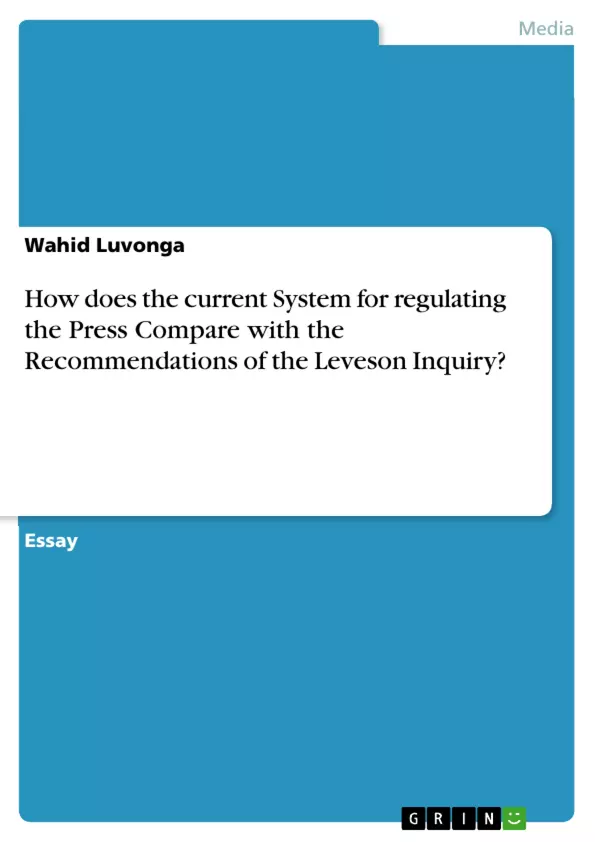This essay will attempt to evaluate how the Leveson inquiry recommendations improved, or did not, the press regulating environment. It will start off by examining the background of the Leveson inquiry and go on to list its recommendations. Subsequently, the essay will assess the current regulating environment and discern if the Leveson recommendations have been effective in curbing unethical issues in journalism.
The press, commonly known as the fourth estate, acts as the guardian of public interest. It is supposed to witness major events and report incidents that nobody else can proclaim. Indeed, it also has the duty to entertain, be opinionated, contemptuous and disruptive if an occasion necessitates it. But not all press acts for the public good. Consequently, the media have in several instances disregarded its own code of ethics and this has severely damaged the life of many innocent individuals. This led to a consensus by many stakeholders that the former “watchdog” Press Complaints Commission (PCC) was unfit to act as a regulator hence the setting up of various watchdogs such as IPSO and the Impress Project to help and bring back public confidence in the media.
Inhaltsverzeichnis (Table of Contents)
- Background of the Leveson Inquiry
- Recommendations of the Inquiry
- Current System of Regulating the Press
- Conclusion
Zielsetzung und Themenschwerpunkte (Objectives and Key Themes)
This essay evaluates how the Leveson inquiry recommendations have affected the press regulation environment in the UK. It examines the background of the inquiry, its recommendations, and the current regulatory landscape. The essay also assesses whether the Leveson recommendations have been effective in curbing unethical practices in journalism.
- The Leveson Inquiry and its recommendations for press self-regulation.
- The effectiveness of the current system for regulating the press in the UK.
- The role of the Royal Charter in press regulation.
- The impact of the Crimes and Courts Act of 2013 on press regulation.
- The effectiveness of self-regulation in ensuring accountability and ethical practices in journalism.
Zusammenfassung der Kapitel (Chapter Summaries)
The essay begins by providing background information on the Leveson Inquiry, which was established in 2011 to investigate phone hacking and unethical practices in the press. The inquiry was divided into two parts, with the first part focusing on the press's relationship with the police, politicians, and the public. The essay outlines the four modules used to examine these relationships and then summarizes the Leveson Inquiry's recommendations for press self-regulation.
The essay then transitions to a discussion of the current system for regulating the press in the UK, highlighting the Royal Charter, the Crimes and Courts Act of 2013, and the role of self-regulatory bodies like IPSO and IMPRESS. The essay critiques the effectiveness of these regulatory mechanisms, particularly IPSO's perceived lack of independence and the government's delay in implementing Section 40 of the Crimes and Courts Act.
The essay concludes with a discussion of the challenges and potential solutions for improving press regulation in the UK. It emphasizes the importance of public trust in the press and the need for a robust and independent regulatory framework that balances press freedom with the protection of individual rights.
Schlüsselwörter (Keywords)
The key topics and concepts explored in this essay include press regulation, self-regulation, the Leveson Inquiry, the Royal Charter, the Crimes and Courts Act of 2013, IPSO, IMPRESS, phone hacking, press ethics, and the role of the media in a democratic society.
Frequently Asked Questions
What was the purpose of the Leveson Inquiry?
The Leveson Inquiry was established in 2011 to investigate the culture, practices, and ethics of the British press following the phone-hacking scandal.
What are IPSO and IMPRESS?
They are self-regulatory bodies for the UK press. IPSO is the largest, while IMPRESS is the only one recognized under the Royal Charter.
What is Section 40 of the Crime and Courts Act 2013?
It is a controversial provision that would require newspapers not belonging to a recognized regulator to pay the legal costs of both sides in libel cases, even if they win.
Why was the Press Complaints Commission (PCC) replaced?
The PCC was deemed a "toothless watchdog" that failed to prevent unethical practices and lacked the power to effectively regulate the industry.
How effective are the Leveson recommendations today?
Effectiveness is debated; while new bodies exist, critics argue that the lack of full implementation of the Royal Charter leaves the press insufficiently regulated.
- Citar trabajo
- Wahid Luvonga (Autor), 2018, How does the current System for regulating the Press Compare with the Recommendations of the Leveson Inquiry?, Múnich, GRIN Verlag, https://www.grin.com/document/417479



